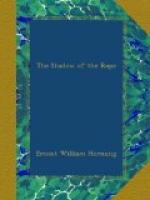There was a jagged hole in the pane above the hasp; an upset of ink on the desk beneath the window; and the ink was drying with the dead man’s blood, in which she now perceived him to be soaked, while the newspaper on the floor beside him was crisp as toast from that which it had hidden when she saw him last.
“Murdered!” whispered Rachel, breaking her long silence with a gasp. “The work of thieves!”
The policemen exchanged a rapid glance.
“Looks like it,” said the one who had opened the door, “I admit.”
There was a superfluous dryness in his tone; but Rachel no more noticed this than the further craning of heads in the doorway.
“But can you doubt it?” she cried, pointing from the broken window to the spilled ink. “Did you think that he had shot himself?”
And her horror heightened at a thought more terrible to her than all the rest. But the constable shook his head.
“We should have found the pistol—which we can’t,” said he. “But shot he is, and through the heart.”
“Then who could it be but thieves?”
“That’s what we all want to know,” said the officer; and still Rachel had no time to think about his tone; for now she was bending over the body, her white hands clenched, and agony enough in her white face.
“Look! look!” she cried, beckoning to them all. “He was wearing his watch last night; that I can swear; and it has gone!”
“You are sure he was wearing it?” asked the same constable, approaching.
“Absolutely certain.”
“Well, if that’s so,” said he, “and it can’t be found, it will be a point in your favor.”
Rachel sprang upright, her wet eyes wide with pure astonishment.
“In my favor?” she cried. “Will you have the goodness to explain yourself?”
The constables were standing on either side of her now.




